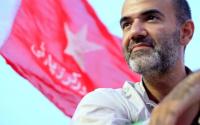Simon TisdallNovember 21, 2002
A grand bargain involving Turkish membership of the European Union, a resolution of the Cyprus conflict, Nato's future relations with the EU's proposed military arm, and US policy in and around Iraq is within reach. But there are only three weeks in which to clinch it.
The deadline is the EU's summit in Copenhagen on December 12 when several new countries in eastern Europe and the Mediterranean are expected to be offered formal membership invitations.
Cyprus is among the aspirants and it will get the green light in Denmark, despite its continuing partition, the result of the 1974 Turkish invasion of the north of the island.
Just in case there is any lingering doubt about that, the Greek government, allied to the Nicosia government led by President Glafcos Clerides, warned this week that any delay in Cyprus's accession schedule could lead Greece to block enlargement for the other nine candidates.
These Greek concerns are almost certainly misplaced. But it remains the case that EU leaders would like to see the Cyprus dispute resolved, and the country reunited through some form of federal or bicommunal arrangement, before enlargement becomes a reality in 2004.
The key, as always, is to be found in Ankara. Rauf Denktash, leader of the Turkish Cypriot community in northern Cyprus, is ill and says he needs more time to study a UN peace plan that has already been accepted in outline by the Greek side. But if the Turkish government makes a strategic decision in favour, pressure on Denktash to go along with it may prove irresistible.
This brings us to Turkey's new de facto leader, Recep Tayyip Erdogan, the landslide victor of recent general elections. He says Turkish membership of the EU is his number one priority. He has been touring European capitals since his election triumph, urging his case.
Unlike previous Turkish leaders, Erdogan has explicitly linked acceptance of his aim of obtaining a date for Turkish accession talks with the EU to resolving the Cyprus dispute. His tacit message seems clear enough. Let us in and Cyprus can be sorted.
In a meeting with Erdogan at Downing Street yesterday, Tony Blair reportedly repeated strong British support for Turkish EU membership talks. Meanwhile, the senior British Cyprus envoy, David Hannay, is busily travelling between concerned capitals this week, pressing the UN framework plan.
Oddly enough (but entirely sensibly), Greece - Turkey's historic rival and sparring partner - has also backed Turkey's EU membership as a way of resolving other bilateral and multilateral disputes. One of these concerns is the sharing of Nato assets with the EU's proposed military force. Turkey, a Nato member, has effectively blocked such cooperation. But this Turkish position can also now be seen as a piece to be sacrificed as part of the much bigger diplomatic chess game.
Like Greece and like Britain, the US also strongly backs Turkey's EU hopes. The US is not a member of the EU, of course. But for strategic reasons, mostly currently relating to Iraq and US need of Turkey's border bases, it has been lobbying EU members intensely to let Turkey in. This week, for example, George Bush personally telephoned the Danish prime minister, currently president of the EU council and Copenhagen host, to make the case.
So what's the problem? It has many faces and many hidden aspects. It was expressed in one respect recently by the former French president, Valéry Giscard d'Estaing, who said Turkish accession would be "the end of Europe". He claimed Turkey could not really be deemed a European country since all but a tiny part of it is, strictly speaking, in Asia.
This geographical particularism disguises, of course, a deeper angst - spreading beyond France to Germany, Austria and other European countries - that the predominantly Muslim Turkey, with its 70 million inhabitants (second only to Germany among EU members) would fundamentally alter the nature of the EU in all sorts of discomforting ways, not least financial but also political and cultural.
To which arguments Erdogan replies, logically, that this might actually be thought a good thing for both democracy and inter-faith understanding. Or else Europe may be regarded as an exclusive "Christian club" which, constitutionally and ideologically at least, it has never admitted to being. This would have negative effects on Turkish and Muslim world opinion, he warns.
Never a man to miss an opportunity to muddy the waters, Romano Prodi, the Italian president of the European commission, put in his tuppence worth this week. After meeting Erdogan, he said discouragingly that Turkey still had more work to do implementing various human rights reforms enacted earlier this year.
Prodi is on the record as opposing a Turkish "rendezvous" date being set in Copenhagen. Prodi can be ignored - he has no vote - but his opinion, shared, if not articulated, by many others, cannot.
It thus remains unclear whether Erdogan will get his wish. And that lack of clarity could yet collapse the Cyprus process and have knock-on consequences for Greco-Turkish relations, for EU defence and security policy, for Turkish cooperation in the war on terror and in Iraq, and thus on overall EU-US relations.
It is all very complicated. And yet it is quite simple really. Europe has been flirting with Turkey for 40 years. It is like a young girl intrigued, fascinated, but a bit frightened, by a handsome stranger. Now the old men of Europe, acting like protective uncles or guardians, are trying to suppress the relationship before it goes any further.
Why do they do this? There are many plausible causes. But the main reason boils down to prejudice - racial, ethnic, historical and yes, perhaps, religious. Turks know this. Europeans, if they are honest, surely do, too. And they all know it is unacceptable, unjustifiable and ugly. The EU should open its arms to the Turks and seize the grand bargain.






